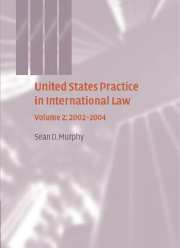Book contents
- Frontmatter
- Contents
- Foreword by Judge Stephen M. Schwebel
- Acknowledgments
- Table of Periodical Abbreviations
- Table of Cases
- Table of U.S. Statutes
- Table of Treaties
- I General International and U.S. Foreign Relations Law
- II State Diplomatic and Consular Relations
- III State Jurisdiction and Immunities
- IV State Responsibility and Liability
- V International Organizations
- VI International Oceans, Environment, Health, and Aviation Law
- VII International Economic Law
- VIII International Human Rights
- IX International Criminal Law
- X Use of Force and Arms Control
- XI Settlement of Disputes
- XII Private International Law
- Annex
- Index
II - State Diplomatic and Consular Relations
Published online by Cambridge University Press: 10 December 2009
- Frontmatter
- Contents
- Foreword by Judge Stephen M. Schwebel
- Acknowledgments
- Table of Periodical Abbreviations
- Table of Cases
- Table of U.S. Statutes
- Table of Treaties
- I General International and U.S. Foreign Relations Law
- II State Diplomatic and Consular Relations
- III State Jurisdiction and Immunities
- IV State Responsibility and Liability
- V International Organizations
- VI International Oceans, Environment, Health, and Aviation Law
- VII International Economic Law
- VIII International Human Rights
- IX International Criminal Law
- X Use of Force and Arms Control
- XI Settlement of Disputes
- XII Private International Law
- Annex
- Index
Summary
OVERVIEW
As of February 2004, the United States recognized 192 independent states worldwide and maintained diplomatic relations with all but five of those states (Bhutan, Cuba, Iran, Iraq, and North Korea). During the period 2002–2004, issues of U.S. recognition of states or governments arose infrequently, but included U.S. recognition of new governments in Afghanistan and Iraq after U.S. intervention in those countries. Separate from the issue of recognition, numerous incidents arose concerning the U.S. treatment of diplomatic and consular personnel and the provision to foreign nationals of their consular rights. In this time period, the United States expelled as persona non grata Iraqi and Cuban diplomats on charges of spying. Perhaps the most notorious issues, however, involved consular rights, especially the fall-out from the LaGrand and Avena cases before the International Court of Justice. Those cases concerned German and Mexican nationals in the United States, who were not notified of their right to consular assistance after their arrests, and were subsequently tried, convicted, and sentenced to death. Germany and Mexico both brought cases before the International Court in efforts to halt the executions, and both obtained decisions from the Court that the United States had violated its obligations under the Vienna Convention on Consular Relations.
- Type
- Chapter
- Information
- United States Practice in International Law , pp. 18 - 40Publisher: Cambridge University PressPrint publication year: 2006



